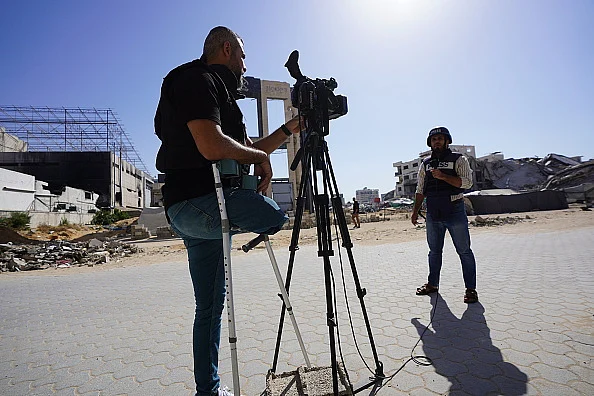Jeff Bezos, the billionaire owner of the Washington Post, had for long reportedly maintained a hands-off policy on the editorial decisions of the legendary newspaper. However, he recently—or more accurately, after Donald Trump's reelection--issued a diktat that the Post라이브 바카라 editorial focus will shift to only carrying opinions on "personal liberties" and "free-market principles". This led to opinion editor David Shipley resigning after three years of working at the paper. This change highlights how editorial choices, including coverage of conflicts like Gaza, are shaped by corporate interests and selective narratives.
Reporters Without Borders report of 2024 estimates that over 200 journalists have been impacted by the Gaza war. Covering the conflict has been incredibly difficult for local reporters, who face power outages, communication breakdowns, and personal tragedies, including the loss of family members, friends, and homes. Freelance journalist Safinaz al Louh described the overwhelming experience of being in Gaza: "The constant noise of the bombing, the explosions, the number of people killed, it's indescribable." She lost her brother, a cameraman, during the war.
The war between Israel and Hamas has been widely covered, yet the lens through which it is presented is shaped by power dynamics, media restrictions, and even the very voices allowed to be heard. The Gaza conflict, much like other global crises, becomes a contested space where fact, opinion, and manipulation often collide.
From the start, the coverage has been fraught with challenges, particularly in terms of the language used and the images shown. Early in the conflict, a deadly blast at the Al-Ahli hospital became a flashpoint, with headlines and language shaping public perception even before the facts were confirmed. The power of words has sparked debates, especially when the BBC faced criticism for its refusal to label Hamas as "terrorists." Veteran correspondent John Simpson defended the policy, emphasizing the importance of neutrality in language and the avoidance of charged terms like "evil" or "cowardly."
Within the New York Times, Washington Post, and Los Angeles Times, the terms "Israeli" or "Israel" overshadow the frequency of references to "Palestinian" or its derivatives, despite Palestinian casualties significantly surpassing Israeli losses. Every two Palestinian deaths warrant just one mention, whereas each Israeli fatality garners eight references, representing a ratio 16 times higher per death compared to Palestinians.
As the Gaza war escalated, media outlets found themselves engaged in a battle over every editorial choice, what stories to cover, which words to use, and which images to show. This battle became more intense as Israel imposed tight restrictions on foreign correspondents, making it even harder for Palestinian journalists to share their voices with Western audiences. Gaza-based journalist Maram Humaid expressed frustration with Western media라이브 바카라 narrow focus on the war, often neglecting the broader Palestinian narrative and distrusting Gazan voices.
The latest press freedom index ranks Palestine at 163rd, slipping six spots from 2024. Out of 180 countries, 112 experienced declines, bringing the global average score to a historic low of 55. The United States also fell two places, reaching a record low score of 57.
Reporters Without Borders criticised President Donald Trump for driving a “worrying decline” in press freedom, noting that during his re-election campaign he frequently attacked the media and openly threatened to use federal powers against journalists. Early in his second term, Trump라이브 바카라 efforts to politicise the Federal Communications Commission (FCC), exclude The Associated Press from the White House, and weaken the US Agency for Global Media signaled deep risks for American news organizations, potentially triggering a press freedom crisis.
At the same time, the Gaza conflict has seen a surge in online misinformation and disinformation. Social media platforms have become battlegrounds for the spread of false narratives, mockery, and the dehumanization of Palestinians. One controversial video featured an Israeli makeup artist pretending to be a Palestinian mother pleading for help, only to call “cut” afterward, drawing outrage for its insensitivity. Other videos mocked the suffering of Palestinians, with users dressing in traditional Palestinian clothing, using makeup to fake injuries, and flaunting luxuries like water and electricity, which many Palestinians were denied during the conflict.
Press freedom is not just a lofty principle. It becomes a survival tool for truth and accountability. According to Reporters Without Borders (RSF), only 52 countries , less than one-third of the world, can today claim a good press freedom environment, while over 70% of nations face severe or very serious restrictions. In conflict zones like Gaza, these numbers translate into silenced local journalists, foreign media bans, and narratives shaped by power rather than on-the-ground facts.














